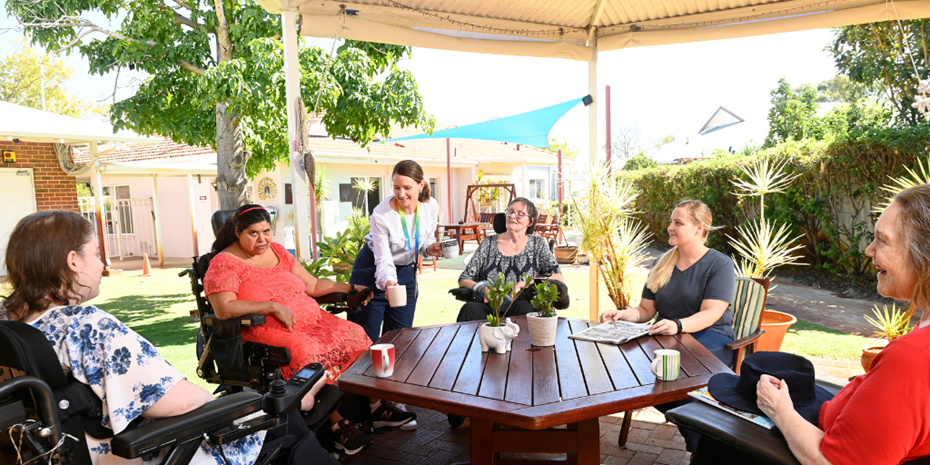

Located in Perth’s northern suburbs in an accessible garden setting are four houses that provide a safe and supportive environment for clients to make a transition back into the community following a life changing event.
This is home to Brightwater Marangaroo’s Transitional Accommodation Program where people with disabilities, aged 16 to 65, who are ready to be discharged from hospital (but not quite ready to move into a supported living environment or return home) can rest and recover.
These clients have had a longer than expected stay in hospital due to a number of health, disability or social issues.
As Tricia Dewar, Brightwater’s Manager Rehabilitation and Community, explains, the program is unique as it supports clients to resolve these issues before they move into community living.
“The program is focused on the whole person,” she said.
“It is very much driven by the wishes of the person and their families in terms of addressing individuals’ circumstances, or barriers that are preventing them from successfully transitioning to back into community living.”
Tricia says the clients who come to Marangaroo can have multiple challenges.
“They might have diabetes Type 2, as well as a mental health diagnosis, that are not well managed,” she says. “They may have early onset dementia or have had an amputation. They often have family or social issues.
“They may be eligible for the Disability Support Pension, but have not applied for it, or they may be getting the pension but not accessing the other benefits that would support them to live a better life.”
Working as a skilled team
Tricia says the team at Marangaroo is skilled in working with clients to address any challenges they face. When a client enters Marangaroo they are allocated a key therapist who is the go-to person for that client and their family.
The client works with the relevant allied health and nursing professionals on goals that are individual to them, with disability Support Workers providing day-to-day supports.
“The issues may be how the client’s health is managed or bringing better stability around mental health,” Tricia adds.
“It's about developing a care plan and team around the person that enables them to move into an appropriately funded – usually a NDIS-funded environment – with the appropriate team of their choice around them.”
The Brightwater Marangaroo team, including Program Manager Adelene Yap and High Care Coordinator Lyn Maitland, has a depth of experience and commitment that means they are uniquely placed to work with these diverse clients who have complex support needs.
“Because everyone’s circumstances are so very different, it's really important that we have a team that's able to effectively identify the individual challenges and look for answers and novel solutions for each client,” Janet Wagland, General Manager Disability says.
Life at Marangaroo
Clients have the opportunity to participate in skill building groups and get support to rebuild their daily living routines.
Marangaroo has flexible visiting arrangements for family and friends and places and opportunities for clients to socialise together. The length of stay depends on the client’s readiness as well as the availability of suitable accommodation and support providers.
“The last thing we want is to discharge someone and then find they've gone back into hospital, and you've got to start all over again,” Janet says. “Because then the client becomes more disillusioned, and it gets even more difficult.”
Client goals drive the program
Janet says transition is not just about moving people from one place to another, but about understanding the person and the life that they want to lead.
She says the goal of Brightwater’s Transitional Accommodation Program is to enable the client to reach the outcomes they want, as much as possible, based on their unique goals.
“I believe this model of service achieves great success with the individual, because it is about the individual achieving what they want,” she adds.
"So that ultimately, when somebody does move on to what's going to be their long-term living option, it’s going to be their best choice and offers them a lifestyle that meets the outcomes they want for themselves.”


